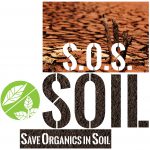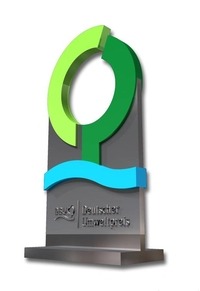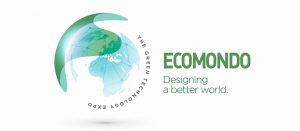|
At the ISWA World Congress on 8 October 2019, the new S.O.S. Soil Initiative was presented to the public and signed by the President of the International Solid Waste Association (ISWA), Mr Antonis Mavropoulos, and Chair of the European Compost Network (ECN), Ms Kristel Vandenbroek.
 The initiative, led by ECN and the Italian Compost and Biogas Association (CIC) aims to highlight the importance of soil organic matter to encourage policy makers to develop instruments to move Europe towards implementing sustainable, climate proof soil management practices. The initiative, led by ECN and the Italian Compost and Biogas Association (CIC) aims to highlight the importance of soil organic matter to encourage policy makers to develop instruments to move Europe towards implementing sustainable, climate proof soil management practices.
Please find the Manifesto 'Save Organics in Soils' here.
If you would like to support this initiative with your signature, please follow this link.
The Manifesto with the signatures will be presented to the EU Commission on the occasion of the Soil Conference 'Soil and the SDGs' (25 November 2019 in Brussels (BE)).

CIC/ISWA/ECN
CIC International Study Tour 2019 on collection and recycling of Biowaste
The 2019 Study Tour organised by Italy's ECN member CIC (the Italian Biogas and Composting Organisation) in cooperation with the ISWA WG on BTW, ECN and other Italian organisation was completed successfully on Oct 4th.
The tour started with a half-day seminar on bio-waste management demonstrating different ways how to collect bio-waste from households. The seminar was opened by the ISWA Working Group Chair on Biological Treatment of Waste Marco Ricci.
Stefanie Siebert, Executive Director of the European Compost Network, welcomed the participants by giving an overview about biowaste management in Europe and introducing the European policy developments on biowaste in the context of the EU Circular Economy package.
In a four-days journey through Italy (from Milan to Verona, heading versus Venice and back) participants could witness:
- how foodwaste is successfully collected separately in metropolitan Cities and small communities, reaching large diversion and good quality
- how modern waste composition analysis are performed by the Italian Biogas and Composting analysis so to monitor the quality of incoming biowaste into AD and Composting facilities
- how composting and biogas works in transforming biowaste into quality compost and biogas (a renewable, CO2 neutral fuel)
- the new trends in biogas production by visiting the 1st italian facility producing biomethane and stripping CO2 that is reaching food&drink grade quality andmeeting with selected technology providers that realise facilities to clean biogas and/or to upgrade it into biomethane by diverting CO2 from being lost into the atmosphere.
The tour allowed participants also to visit different Italian towns such as Milan, Lecco, Verona and Bergamo and getting in touch with local food culture.
The program of the tour can be found here.
The ECN presentation ‘Circular Economy and Biowaste in Europe’ can be downloaded here.
More information from Marco Ricci - Juergensen (ricci.eco@gmail.com) chair of the ISWA WG on BTW and Senior Expert at the Italian Composting and Biogas Association, Italy

EU Council Conclusions
New Action plan on Circular Economy
In its Conclusions adopted at the Environment Council meeting on 4 October 2019, the Council of the EU confirms its support for the circular economy policy and reiterates that it will remain a priority in the coming years. Therefore, it invited the Commission to present at least two strategies in the coming months.
First, a new action plan for the circular economy that identifies targets, tools and indicators for, inter alia, the food sector in a way that it could contribute to reducing greenhouse gas emissions, the loss of biodiversity and land degradation. Second, a long-term strategic framework – for either 2030 or 2050. The strategic framework should address the issue of bioplastics and biodegradability.
A system that allows waste to be managed correctly, safely and sustainably, and the full implementation of EU waste acquis are both cornerstones to prevent resources from being lost. The Council invites Member States to fully implement the rules, and to use existing EU funding to increase the capacity of the recycling infrastructure. Moreover, the Commission is invited to present a proposal for the revision of the EU waste shipment regulation that should facilitate the movement of waste destined for recycling in order to incentivize market availability of high-quality, toxic-free products obtained from recovered materials.

German Federal Environmental Foundation
German Environment Prize 2019 awarded for Soil Science and Circular Economy
 On 27 October 2019 the German Environmental Prize was awarded by German President Frank-Walter Steinmeier to the soil scientist Prof. Dr. Ingrid Kögel-Knabner from the Technical University of Munich, and to the entrepreneur Reinhard Schneider from Mainz, whose company, Werner & Mertz, is in the laundry detergent and cleaning product industry and is dedicated to comprehensive sustainability at every stage of production. On 27 October 2019 the German Environmental Prize was awarded by German President Frank-Walter Steinmeier to the soil scientist Prof. Dr. Ingrid Kögel-Knabner from the Technical University of Munich, and to the entrepreneur Reinhard Schneider from Mainz, whose company, Werner & Mertz, is in the laundry detergent and cleaning product industry and is dedicated to comprehensive sustainability at every stage of production.
The prize is awarded by the German Environmental Foundation (DBU) and has a remuneration of EUR 500.000. DBU General Secretary Alexander Bonde emphasized that they are both “innovators in the field of environmental protection who provide us with the solutions of the future for the enormous ecological challenges of the present. We need fundamental economic, political and technological change processes at all levels in order to find truly sustainable development.”
Prof. Dr. Ingrid Kögel-Knabner: One of the most influential soil scientists in the world
Bonde pointed out that, as one of the most renowned and influential soil scientists and researchers in the world, Dr. Kögel-Knabner has succeeded in shining a light on the central role played by the environmental medium of soil, which is often “fatally underestimated” in terms of importance compared to air and water. A major milestone in her research has been the discovery of how carbon is locked into the soil as an organic substance. After all, given the fact that plants absorb climate-damaging carbon dioxide from the air, which then ends up in the soil, it is the largest reservoir of carbon in the world, but plants also emit greenhouse gases as they decompose. For this reason, soil is incredibly important for the climate itself as well as for preventing climate change. Bonde: “Her research has provided us with a completely new understanding of the capacity of the soil to absorb and store carbon. More than anything, Dr. Kögel-Knabner has provided us with answers to the question of how soil can be used for long-term carbon storage in order to prevent climate change.”
Schneider: “A comprehensive sustainability strategy with a great deal of personal dedication.”
When introducing Schneider, Bonde highlights the fact that “with his comprehensive corporate sustainability strategy and high level of personal dedication”, he has paved the way for environmental standards to be established at an ever-higher standard across an entire economic sector. Schneider is fighting for a closed-cycle energy-saving plastic recycling process. As a “pioneer of the circular economy”, he refuses to accept the fact that just a small proportion of the plastics from household recycling are actually mechanically recycled. Despite the increased production costs of recycled plastics, Schneider launched a recycled materials initiative in 2012 with partners from the fields of industry, retail and NGOS that is open to all potential participants. This is intended to quickly increase the proportion of recycled products and establish them on the mass market. He has produced more than 293 million bottles made solely of recycled plastic in the recycled materials production facility he built in Mainz. Since 2013, he has used oils from local plants – meaning oils obtained from flax, hemp or olives grown in Europe – as the raw material basis for the laundry detergents and cleaning products sold under the “Frosch” brand. These oils are increasingly being used to replace palm kernel oil from tropical regions, which is bad for the environment. Bonde: “A medium-sized company owner with the right attitude who demonstrates his commitment to environmental protection with a clear and consistent approach.”
The DBU press release can be accessed here.
More information about the laureates can be accessed here.

WRF'2109 Antwerp
Comprehensive report on meetings and seminars published
OVAM, the Public Flemish Waste Agency, presented the WRF’19 Meeting Report on 28 October 2019, disclosing the highlights of the World Resources Forum ’19 ‘Closing Loops – Transitions at work’, held in the city of Antwerp (Belgium).
This meeting report gives an overiew of the main insights of plenaries and global sessions and summarizes the main findings of all ‘deep dive’ workshops. This report is the result of the endeavors of dozens of organisations, sponsors, speakers and up to 750 participants from 60 countries.
Of special interest is the text on the Soil Sessions (p.10). The workshop organised by ECN 'Marketing tailormade compost digestate-based products' is summarized on page 29. (Unfortunately there is a wrong website cited).
The WRF’19 report is available here.

Announcement
ECOMONDO, 5-8 November, Rimini (IT)
 From today the 23rd ECOMONDO is held. This event is an important European event for technological and industrial innovation. It will bring together all sectors of the circular economy on a single platform: from the recovery of materials and energy to sustainable development. From today the 23rd ECOMONDO is held. This event is an important European event for technological and industrial innovation. It will bring together all sectors of the circular economy on a single platform: from the recovery of materials and energy to sustainable development.
ECN is taking part on Wednesday (6 November) in the session 'The Bio-Waste Management chain: A comparison between international experiences presentation'. ECN Executive Director Stefanie Siebert is helding a presentation on Bio-Waste Management across Europe (10:00 h) in cooperation with Jonas Åbo Mortensen, Copenhagen Municipality. Mrs Siebert is helding a second presentation on ECN activities in the 'Conference on composting and anerobic digestion' (organised by CIC on 6th November from 9:30 to 13:00 h).
More information on the programm of ECOMONDO is available here.
|